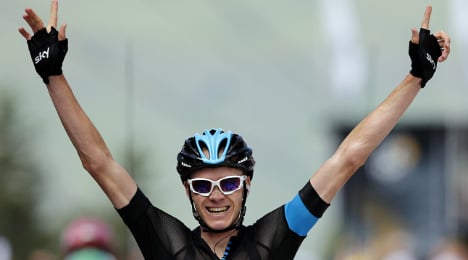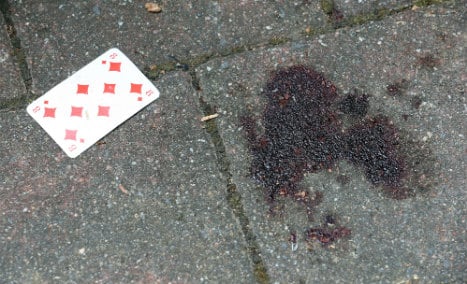Team Sky said they are ready to adapt their strategy for the remainder of the Tour de France after the "war" of stage nine shook up race leader Chris Froome.
After the euphoria of Froome's stunning victory atop Ax-Trois-Domaines gave the Kenyan-born Briton the race lead on Saturday, Sky were put to the test on Sunday's second day in the Pyrenees as teams colluded to loosen their grip.
By the end of the stage Froome was still in command but aggressive racing by Sky's rivals saw Australian teammate Richie Porte, sitting second overall at 51secs overnight, tumble to the nether regions of the overall standings.
Sky's spectacular collapse left Froome on his own and exposed to attacks by rivals like Alberto Contador (Saxo) and Alejandro Valverde (Movistar).
Froome ultimately weathered the storm, and team principal Dave Brailsford gave him a pat on the back.
"To use a boxing analogy, he's taken the biggest right hook on the chin and he didn't flinch," said Brailsford.
Faced with suggestions that Sky had hit too hard, too soon and have upset rivals who will pounce later in the race, Brailsford was defiant.
"We've learned some lessons and there are some valuable lessons to be learned that we will take into the rest of the race," he said.
Brailsford was hesitant to elaborate but added: "We will adapt our strategy for the rest of the race. I'm not going to go into the details of what we're going to change."
While Froome did not lose any time on stage nine, the loss of Porte as a potential podium finisher is a major handicap for Sky in terms of tactics.
Attacks by either rider in the coming mountain stages would likely prompt rivals to spend energy counter-attacking, allowing Sky to save energy and attack when they decide the time is right.
Froome admitted: "From my side it's a huge shame that we don't have that card to play now, and of course it's a shame for Richie."
Porte, meanwhile, put his collapse down to an 'off-day', a common occurrence for riders on the demanding three-week Grand Tours.
"Anybody here who's been a bicycle racer knows on the Grand Tours you have good and bad days," said the Australian, the reigning Paris-Nice champion.
But he admitted that Sky's success on Saturday had elicited an "angry" response from their rivals.
"There was an angry peloton that threw everything they had at us… Yesterday was a special day, it makes for great viewing at home. But it was an absolute war."
After Sunday's stage Froome and Porte admitted they had both possibly suffered their "worst" day on the bike.
And with 12 stages remaining, including a time trial on Wednesday over 33 km and several brutal days in the Alps in the final week, most will expect Sky to come under attack again.
Porte, for one, is hoping Froome can help restore order in the peloton by taking more time off his rivals in Wednesday's time trial.
"My hope is that it (race) will become a little bit more controlled, and it is going to get easier after the time trial," added the Tasmanian.
Brailsford, meanwhile, says his team will simply have to adapt their strategy as the race moves on towards the Alps. Stage 15 to Mont Ventoux could be the next battleground.
"I don't have a crystal ball," added Brailsford.
"This is sport… we're here, we've got a team of committed riders, we've got some strong opposition, we're leading the race, we've got some time trials to come, some different mountain stages and we'll try to adapt our strategy for those."



 Please whitelist us to continue reading.
Please whitelist us to continue reading.
Member comments